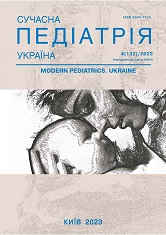Peculiarities of the psychological state of internally displaced school-age children and adolescents in war conditions
DOI:
https://doi.org/10.15574/SP.2023.132.51Keywords:
internally displaced children of school age, adolescents, psychological stateAbstract
Since the war escalated on February 24th, 2022, 1,148 children have been killed or injured, and nearly 5.9 million have become internally displaced persons (IDPs) according to UNICEF. The state of health of children who are IDPs requires the close attention of doctors and psychologists.
Purpose - to investigate the psychological and psycho-emotional state of schoolchildren and adolescents who are IDPs in the conditions of war in order to substantiate the strategy and tactics of the use of health-preserving technology.
Materials and methods. Psychological and psycho-emotional state of 1017 school-age children and adolescents who are IDPs aged 11-17 years and their parents (n=1231) who lived in Lviv and the Lviv region at the time of the study. In May 2022 anonymous questionnaire was conducted for them. The questionnaires were developed by the executors of the scientific research work «To study the age and gender characteristics of the predictors of the transformation of behavioral risk factors for the health of adolescents in the conditions of war».
Results. It was found that 53.9% of children were forced to be separated from their families, 21.3% were under shelling; 5.8±0.7% experienced the death of their relatives; 11.4±1.0% suffered from hunger, lack of drinking water and cold. One in three children felt helpless and despair, and one in five had panic attacks. At the same time, 85% of children believed that the horrors of war would end and everything would be fine. 23% of children experienced dizziness, headaches, heart palpitations, and abdominal pain when there was no reason for it. 26.5% of children sought medical help.
Conclusions. Almost a third of all interviewees had a constant feeling of anxiety, a fifth had panic attacks, a sense of danger, insecurity. Children had increased negative emotions compared to pre-war times. One third of the children’s mental health has deteriorated, but almost none of them have sought psychological support from specialists. Feelings of dizziness, headache, rapid heartbeat, abdominal pain, when there was no reason for this, were identified in every fifth child, which can be the basis for the formation of psychosomatic pathology. The factor that stabilized the psycho-emotional state of both children and their parents was the belief that the horrors of the war will end and everything will be fine, and almost 85% of the respondents answered this way. This indirectly indicates a sufficient potential for viability. The organization of a multidisciplinary team consisting of psychologists, doctors, and teachers is an actual form of medical and psychological assistance to school-age children and adolescents who are IDPs.
The research was carried out in accordance with the principles of the Helsinki Declaration. The study protocol was approved by the Local Ethics Committee of all participating institutions. The informed consent of the patient was obtained for conducting the studies.
No conflict of interests was declared by the authors.
References
Antipkin YG, Volosovets ОP, Maidannik VG, Berezenko VS, Moiseenko RО, Vygovska OV et al. (2018). Status of child population health - the future of the country (part 1). Zdorov'e Rebenka. 13 (1): 1-11. https://doi.org/10.22141/2224-0551.13.1.2018.127059
Balakireva ОМ, Bondar TV, Danylenko GM, Levin RYa, Nguyen N-MK, Pavlova DM et al. (2019). Social conditionality and indicators of adolescent and youth health in Ukraine: according to the results of a sociological study within the framework of the international project «Health and behavioral orientations of Ukrainian youth». Kyiv: Foliant: 127.
Fernando C, Ferrari M. (2013). Handbook of Resilience in Children of War. New York: Springer: 311. https://doi.org/10.1007/978-1-4614-6375-7
IOM. (2023). Migration Data Portal: Ukraine. URL: https://www.migrationdataportal.org/ukraine/crisis-movements.
Mohseni M, Ghasemi Dastgerdi A, Eftekhari Renani M. (2020). War, armed conflict, and children's health. Archives de pediatrie. 27 (6): 348-349. https://doi.org/10.1016/j.arcped.2020.05.009; PMid:32563620
Peresypkina TV, Redka IV, Sydorenko TP, Necheporenko NI, Golubnycha GI, Peresypkina AM. (2019). Metodyka otsinky informatsiinoi znachushchosti medyko-sotsialnykh faktoriv, yaki vplyvaiut na zdoroviaoriientovanu povedinku shkoliariv. Avtorske pravo na tvir No. 89688 vid 11.06.19.
Slabky GO, Melnyk PS, Dzyuba OM, Chepelevska LA, Kudrenko MV. (2017). Shchorichna dopovid pro stan zdorovia naselennia, sanitarno-epidemichnu sytuatsiiu ta rezultaty diialnosti systemy okhorony zdorovia Ukrainy. 2016 rik. Kyiv: MOZ Ukrainy, DU «UISD MOZ Ukrainy»: 516.
The Lancet Child Adolescent Health. (2022). Children: innocent victims of war in Ukraine. Lancet Child Аdolesc Health. 6 (5): 279. https://doi.org/10.1016/S2352-4642(22)00102-X; PMid:35366398
Theirworld. (2023). Education and trauma help for children living in Ukraine war zone. 2022. URL: https://theirworld.org/news/education-and-trauma-help-for-children-in-ukraine-conflict-zone/.
UNICEF. (2023). UNICEF Ukraine Humanitarian Situation Report No. 24: 24 February - 31 December 2022. URL: https://reliefweb.int/report/ukraine/unicef-ukraine-humanitarian-situation-report-no-24-24-february-31-december-2022.
Downloads
Published
Issue
Section
License
Copyright (c) 2023 Modern pediatrics. Ukraine

This work is licensed under a Creative Commons Attribution-NonCommercial 4.0 International License.
The policy of the Journal “MODERN PEDIATRICS. UKRAINE” is compatible with the vast majority of funders' of open access and self-archiving policies. The journal provides immediate open access route being convinced that everyone – not only scientists - can benefit from research results, and publishes articles exclusively under open access distribution, with a Creative Commons Attribution-Noncommercial 4.0 international license (СС BY-NC).
Authors transfer the copyright to the Journal “MODERN PEDIATRICS. UKRAINE” when the manuscript is accepted for publication. Authors declare that this manuscript has not been published nor is under simultaneous consideration for publication elsewhere. After publication, the articles become freely available on-line to the public.
Readers have the right to use, distribute, and reproduce articles in any medium, provided the articles and the journal are properly cited.
The use of published materials for commercial purposes is strongly prohibited.

